Covid-19: Swann downplays easing of restrictions for Easter
- Published
- comments

Restrictions were imposed in Northern Ireland on 26 December to manage the spread of Covid-19
Northern Ireland's health minister has played down the prospect of lockdown restrictions being eased in time for Easter.
On Thursday, the executive extended restrictions until 1 April.
A review of the current measures will take place on 18 March.
Five more coronavirus-related deaths were reported by the Department of Health on Friday, bringing its total number of deaths to 2,026. It also recorded another 313 positive cases.
Robin Swann reiterated that the pathway-to-recovery roadmap on easing restrictions, due to be published on 1 March, will be linked to data as opposed to specific dates.
Speaking on the BBC's Good Morning Ulster programme, he said: "One of the approaches the executive made in the first wave was to follow the data, not the dates and that approach has been replicated in other jurisdictions.
"So the roadmap will set a trajectory that won't be tied to dates and will be very clear about following the science."
The current restrictions were imposed in Northern Ireland on 26 December to manage the spread of Covid-19.
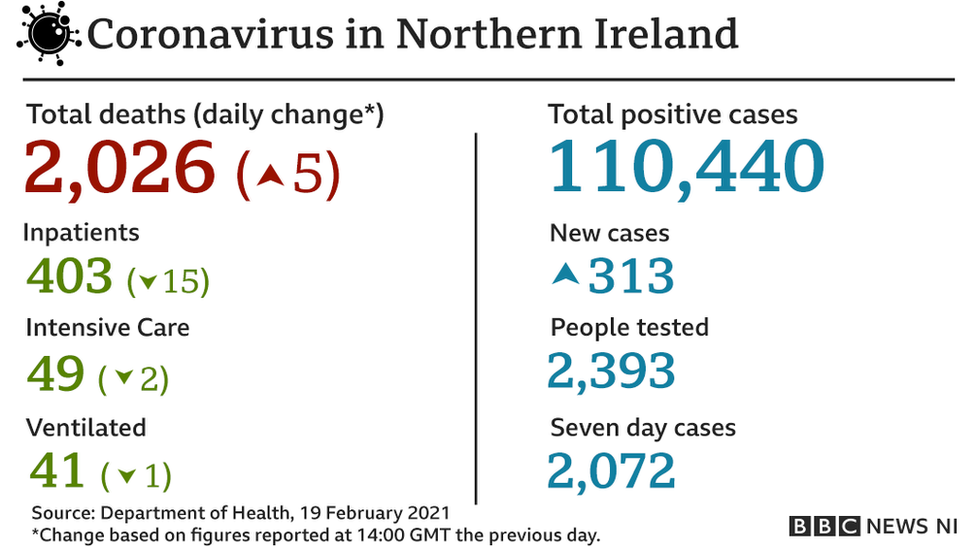
Mr Swann said the health service is currently supporting more Covid-19 inpatients than at the peak of the first wave.
"So there would be no point in saying that where we will be in a number of weeks time will be far better than where we were at the same period of the first wave," he said.
There are 403 people with Covid-19 in hospitals across Northern Ireland, of which 49 are being treated in intensive care and 41 have been ventilated.
Vaccines for all carers
However, the vaccine does provide more cause for hope of recovery in this wave, the health minister added.
On Friday afternoon it was announced that all carers over the age of 18 can now book the Covid-19 vaccine at a regional vaccination centre after the scheme was again extended.
Previously only carers over 50 were eligible, but Mr Swann said he had decided to remove the age criteria and "open this up to all carers".
"If you are a carer of someone who is elderly or disabled, you can now book your vaccine online at one of the seven trust centres," he said.
The latest NI Department of Health figures show that as of Friday, 466,524 vaccines have been administered, of which 436,143 were first doses and 30,381 were second doses.
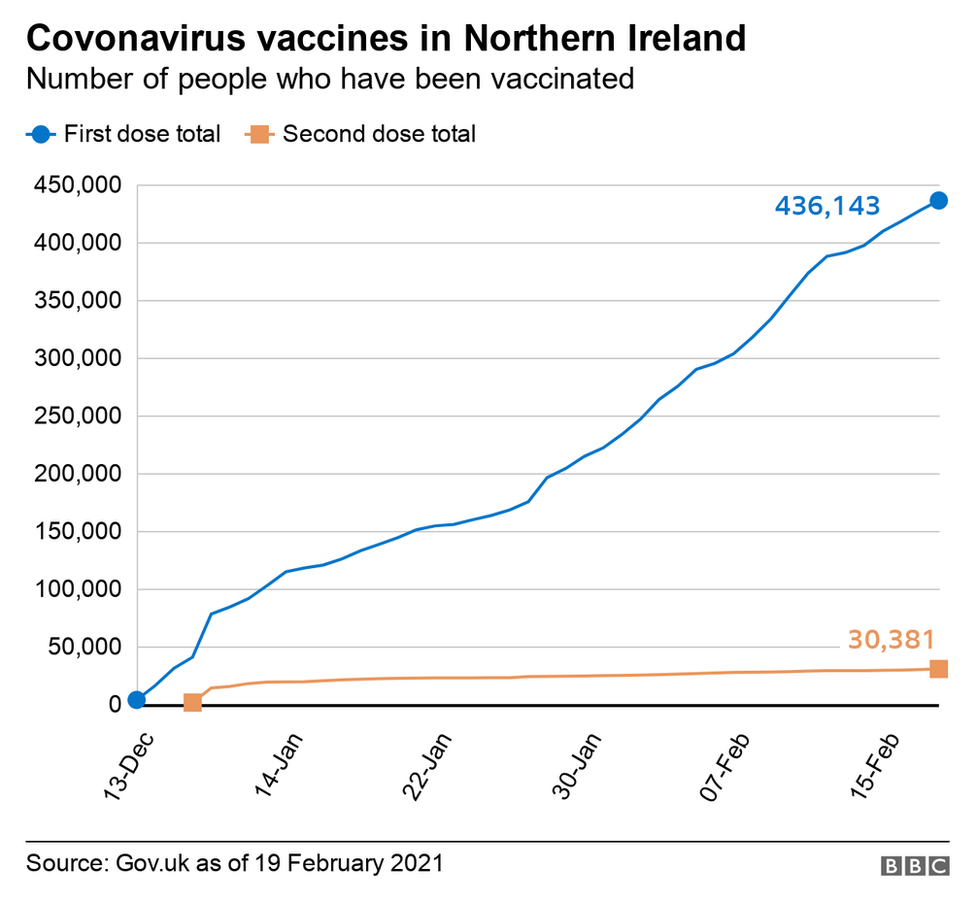
On Thursday, Mr Swann said he hoped to expand Northern Ireland's vaccine programme to carers of all ages soon.
Speaking on Friday morning, he said: "That will be the difference this time around that we didn't have last time - that extra support that the vaccine is actually bringing.
"But we're balancing hope with caution. Anything we're doing now will be reviewed on 18 March.
"The figures are moving in the right direction, but they started from a very high point this time around."
'Starting to make progress'
Mr Swann said the vaccine programme is beginning to make a difference.
"It's really starting to make progress in the over 75s, but it takes time for that vaccine to have the positive impact it needs to have."
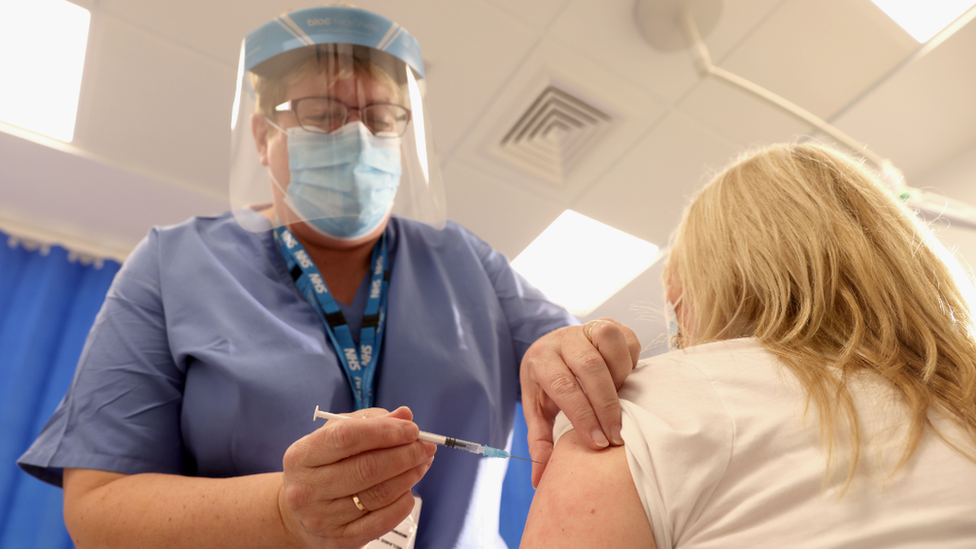
The health minister said the vaccine programme is beginning to make a difference
Health officials have said they want to avoid a possible rise in cases around St Patrick's Day on 17 March.
Mr Swann said there was "a realisation across the executive table that if we take [easing lockdown] on a measured basis, we won't end up going back... into full lockdown in a few months time".
'Half way down the slope'
The head of the BMA in NI, Dr Tom Black, told BBC Radio Foyle it would have been difficult to justify further lifting of lockdown measures when the number of infections and hospital inpatients remains high."We are half way down the slope, but have another few weeks of work to do," Dr Black said."We can't afford to ease up for St Patrick's Day, we can't ease up for Easter. "This continued lockdown is what is going to free up the summer, this is giving you the opportunity for some normality during summer."
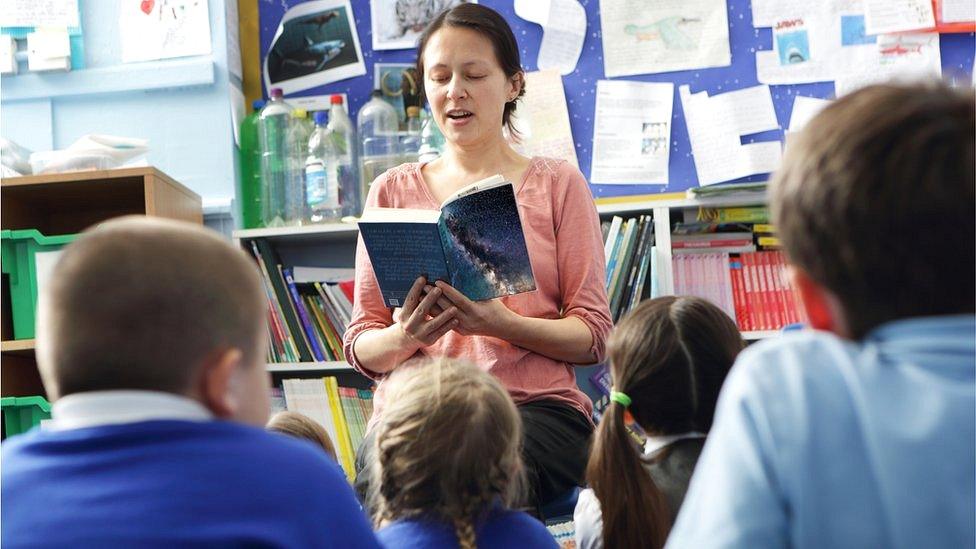
It is planned that a limited number of year groups will go back to class on 8 March
On Thursday, it was announced that pre-school, nursery and primary school pupils in P1 to P3 (aged four to seven) will go back to school in Northern Ireland on 8 March.
They will then resume remote learning on 22 March to enable the return of years 12 to 14, until the start of the Easter holidays.
Mr Swann said: "From a health point of view, it's about seeing a cohort to return for a few weeks and allowing us to asses what impact that has had on transmission and the R number."
He added that the decision over which year group returned was "not something [the Department of Health] would get involved in".
Stormont ministers have also agreed slight changes to click-and-collect services for some retailers.
Those services will resume from 8 March for baby equipment shops, clothing shops, footwear shops and electrical goods shops.
From that date, the number of people allowed to meet outdoors in a public space will increase to 10 people from two households.
'Survival mode'
Meanwhile, a body representing NI hotels has published a plan it said will help the industry recover from lockdown.
The NI Hotels Federation said the tourism industry would be in "survival mode" for the immediate future.
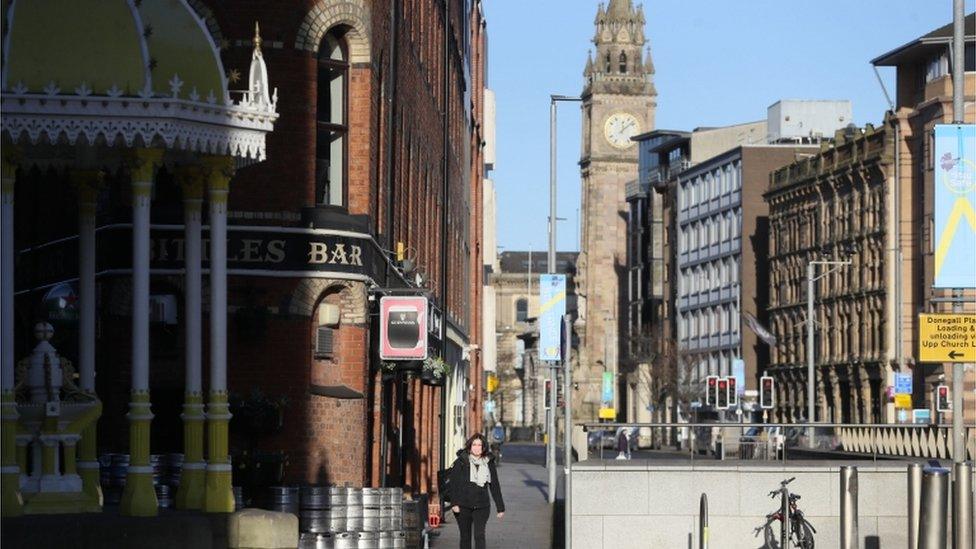
Janice Gault said early closing times had a significant impact on trading viability
Its 'Return to Trading' plan sets out eight requests for the executive to consider, including the removal of the earlier closing time of 23:00 for hospitality, which was in force before the lockdown was imposed.
The body's chief executive, Janice Gault, said the restriction had "little effect on the spread of the virus, but has significant impact on the viability of trading".
She said extension of a reduction in VAT to 5% beyond 31 March was imperative and called for an extension of business rates relief for the next financial year, as well as a "staged and controlled end" to the furlough scheme.
The document also suggests that holiday-at-home vouchers should be issued to promote domestic tourism as Northern Ireland emerges from lockdown in the coming months.
- Published14 February 2021
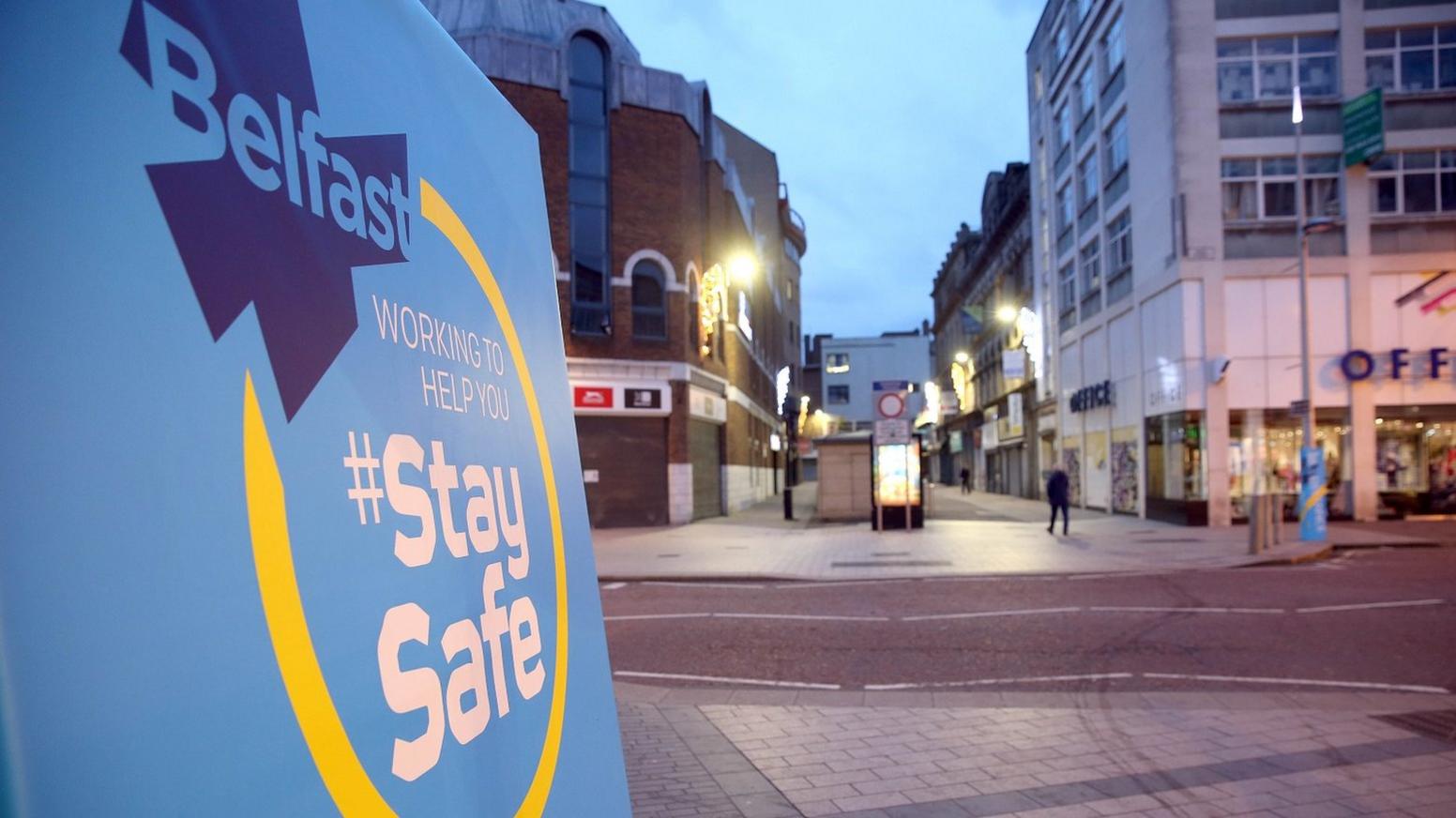
- Published10 February 2021
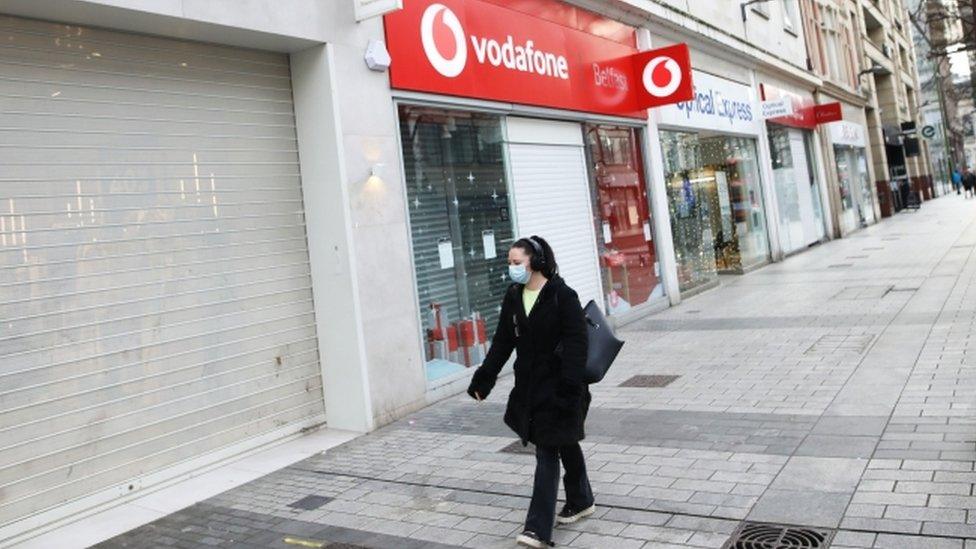
- Published2 April

- Published29 July 2021
